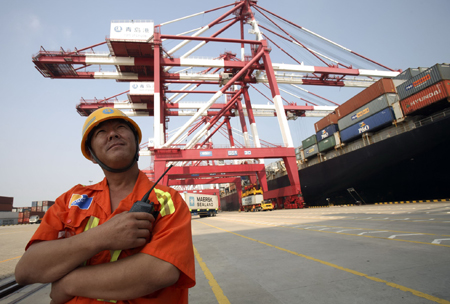-
News >Bizchina
Calm waters ahead for Qingdao Port expansion
2010-11-11 13:31
Group plans massive investment to expand oil and coal docking facilities
A dockworker stands in the Qianwan container terminal of Qingdao Port in Shandong province. Qingdao Port (Group) Co Ltd plans to considerably expand facilities to enable it to surpass Busan Port in South Korea.?[Photo/Bloomberg]
GUANGZHOU - The Port of Qingdao, the world's ninth-largest, will triple its annual investment from more than 3 billion yuan ($452.17 million) to 10 billion yuan in 2011, said Chang Dechuan, president of Qingdao Port (Group) Co Ltd, on Tuesday.
He added that Qingdao will also construct a 300,000 ton oil dock and a 250,000 ton coal dock.
"Next year will be crucial for the port's extension," he told reporters during the World Shipping (China) Summit.
The port will realize a container throughput of more than 12 million twenty-foot equivalent units (TEUs) and total throughput of more than 350 million tons in 2010, Chang said.
He expected a year-on-year increase of 8 percent for total throughput and 10 percent for container throughput in 2011.
"The port capacity is less than the actual throughput, that's why we are accelerating investment to expand the docks to accommodate larger ships," he said.
It is also considering preparing further dock construction for Chinamax, a domestically manufactured ship of 400,000 tons, which will be delivered in the first quarter of next year.
In 2010, the port invested more than 3 billion yuan to construct an iron ore dock of 300,000 tons.
Chang said the increased investment will be raised by the port itself. Apart from dock construction, the money will also be used to introduce new technologies and restructure work processes.
Annually, Qingdao Port will spend about 30 million yuan on clean and green operations to reduce energy consumption and environmental pollution.
Since 2009, the port has been tweaking its business strategy to focus more on the import side by reducing the momentum on its more export-oriented container business and focusing on more profitable iron ore and oil imports.
As the nation's largest iron ore and crude oil port, it has focused on the container sector in recent years, and is expected to surpass South Korea's Busan Port to become Northeast Asia's market leader in one or two years.
In 2009, the port finalized a total throughput of 315 million tons. The revenue was more than 12 billion yuan, and profit rose 6 percent year-on-year to 2.8 billion yuan.
Chang said revenue will further increase this year, and profits will rise by more than 10 percent year-on-year to more than 3 billion yuan.
He added that he is confident that profit growth for 2011 will maintain a strong momentum by exceeding 10 percent.
The port now has gross capital of more than 37 billion yuan, and has already cleared all debts this year.
It is gearing up to become the international freight center of Northeast Asia, constructing a series of new docks and developing a newly approved bonded area.
"Actually, we are building another Qingdao Port," said Tian Guangwen, vice-president of the group, in an earlier interview, referring to the new construction project in Dongjiakou, south of the port's 117-year-old base in Jiaozhou Bay.
"How huge a ship can be depends on how huge a dock we have," said Wang Baosheng, vice-chairman of the group's business department.
Wang said the new dock at Dongjiakou will be the first in China to accommodate ships big enough to carry 400,000 tons.
The port will build four docks for ships with a 400,000 ton capacity, two for ships with a 200,000 ton capacity and five docks for ships with a 100,000 ton capacity.
According to the construction plan, 112 berths will be constructed at Dongjiakou, 21 more than at the existing port.Tian said the capacity of the new docks will be about 40 million tons in three to five years, exceeding the traffic of the existing Qingdao Port.
As part of its expansion project, Qingdao is also developing a bonded port area to attract more domestic and international resources.
Approved on Sept 1, 2009, the first phase of a 9.7-square-kilometer bonded area in Qianwan consists of eight container berths, two multifunctional berths, and dock operations for comprehensive logistics, international logistics and export machinery.
The port expects to take advantage of the convenient customs procedures and favorable tax policies within the area, and to increase container quantity first, then attract cargo from Busan Port with better service.
